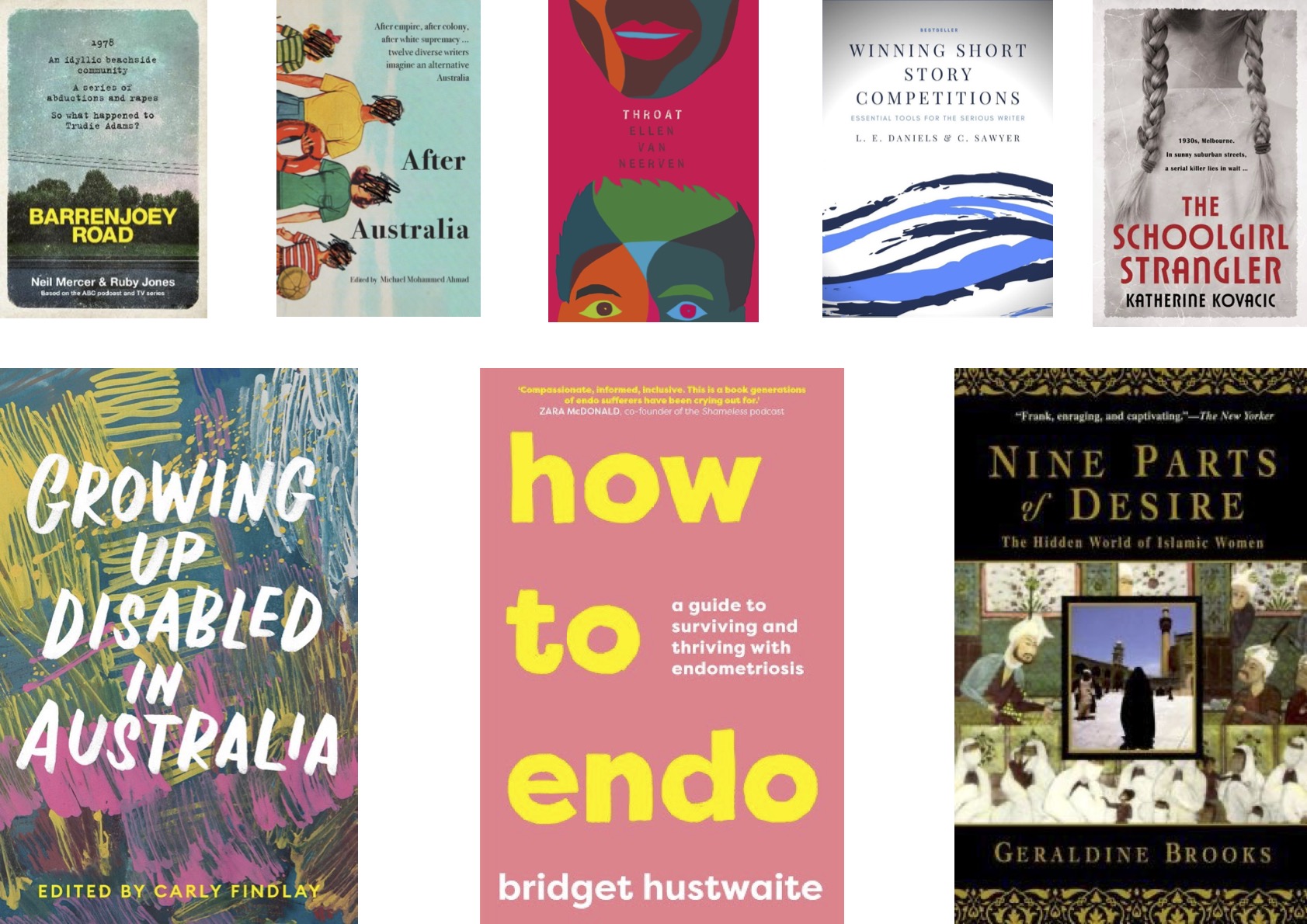
Hello Readers!
For February there was:
Reviews: 12
Reviewers: 9
Books Reviewed: 12 (2 poetry)
The most prolific reviewer was: Cass Moriarty with 3 books reviewed – congratulations & thank you!
This month each book was only reviewed once.
As always, click on the coloured quote from a review to be taken directly to it.
Disability & Illness
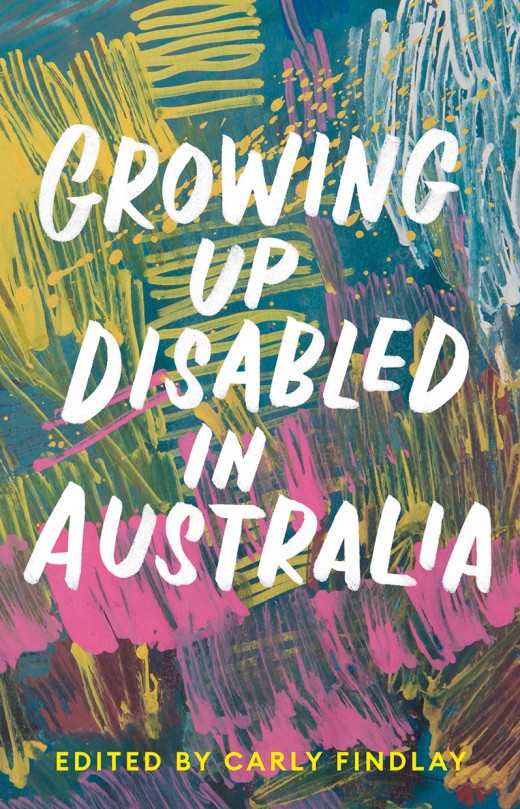 To begin we have two very new releases in the field of disability and illness. The first is Growing Up Disabled in Australia (2021) which is the latest in the “in Australia” series that includes Growing Up Aboriginal and Growing Up Queer amongst others. It is edited by the indomitable Carly Findlay and includes a range of contributors. Cass Moriarty says “this book is a frank and informative ‘own voices’ memoir compilation of what it means to be labelled as disabled, how that affects people differently, the challenges disability provokes but also the strength and self-confidence people with disabilities often demonstrate in their lives.” In its entirety it is a great overview with insightful commentary and is a review really worth reading in full (which you can do here). This book is definitely on my to-read list!
To begin we have two very new releases in the field of disability and illness. The first is Growing Up Disabled in Australia (2021) which is the latest in the “in Australia” series that includes Growing Up Aboriginal and Growing Up Queer amongst others. It is edited by the indomitable Carly Findlay and includes a range of contributors. Cass Moriarty says “this book is a frank and informative ‘own voices’ memoir compilation of what it means to be labelled as disabled, how that affects people differently, the challenges disability provokes but also the strength and self-confidence people with disabilities often demonstrate in their lives.” In its entirety it is a great overview with insightful commentary and is a review really worth reading in full (which you can do here). This book is definitely on my to-read list!
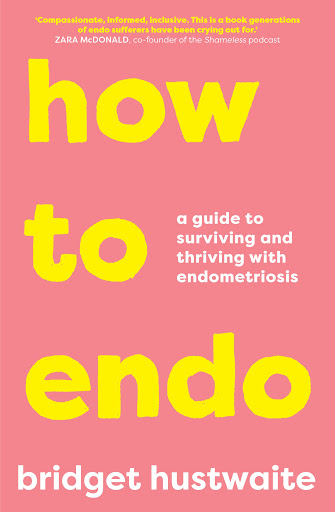 The second title is Bridget Hustwaite’s How to Endo (2021) reviewed by Brenda Telford. Covering everything from diet to acupuncture, fertility to mental health, and surgery to sex, it is a guide to navigating the debilitating and chronic illness that is endometriosis. Brenda writes “Bridget is a down to earth person who says it as it is, which makes How to Endo nothing like a medical textbook. Everything in this amazingly detailed book is bound to help endo sufferers everywhere.” As Brenda’s mention of her own daughter and a few of the comments on the review show, we are only just beginning to recognise how widespread this disease is and the impact it is having on those with a uterus. It is long overdue.
The second title is Bridget Hustwaite’s How to Endo (2021) reviewed by Brenda Telford. Covering everything from diet to acupuncture, fertility to mental health, and surgery to sex, it is a guide to navigating the debilitating and chronic illness that is endometriosis. Brenda writes “Bridget is a down to earth person who says it as it is, which makes How to Endo nothing like a medical textbook. Everything in this amazingly detailed book is bound to help endo sufferers everywhere.” As Brenda’s mention of her own daughter and a few of the comments on the review show, we are only just beginning to recognise how widespread this disease is and the impact it is having on those with a uterus. It is long overdue.
Special Mentions
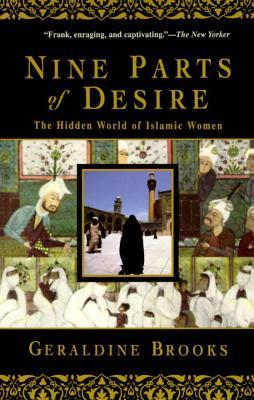 Sometimes I think we have a tendency to disregard books that we perceive as being published ‘too far’ in the past because we are (rightly) looking to the new stories Australian women are writing. But I am glad this month to have a book from 1995, as our stories are all built on the stories that came before them. Janine Rizzetti at The Resident Judge of Port Phillip reviewed Geraldine Brooks’ Nine Parts of Desire: the Hidden World of Islamic Women. And as she says:
Sometimes I think we have a tendency to disregard books that we perceive as being published ‘too far’ in the past because we are (rightly) looking to the new stories Australian women are writing. But I am glad this month to have a book from 1995, as our stories are all built on the stories that came before them. Janine Rizzetti at The Resident Judge of Port Phillip reviewed Geraldine Brooks’ Nine Parts of Desire: the Hidden World of Islamic Women. And as she says:
Although the review also points to some of the potentially outdated or oblivious points the book makes, it is essentially about “how we, as Europeans, should respond” to gendered Islamophobia especially because, as Janine notes, “I am even more conscious of the issues that she raises, especially after the Arab Spring sputtered out. Her criticism is most strongly directed at Saudi Arabia, a country which has assumed even more importance on the world stage since Trump.”
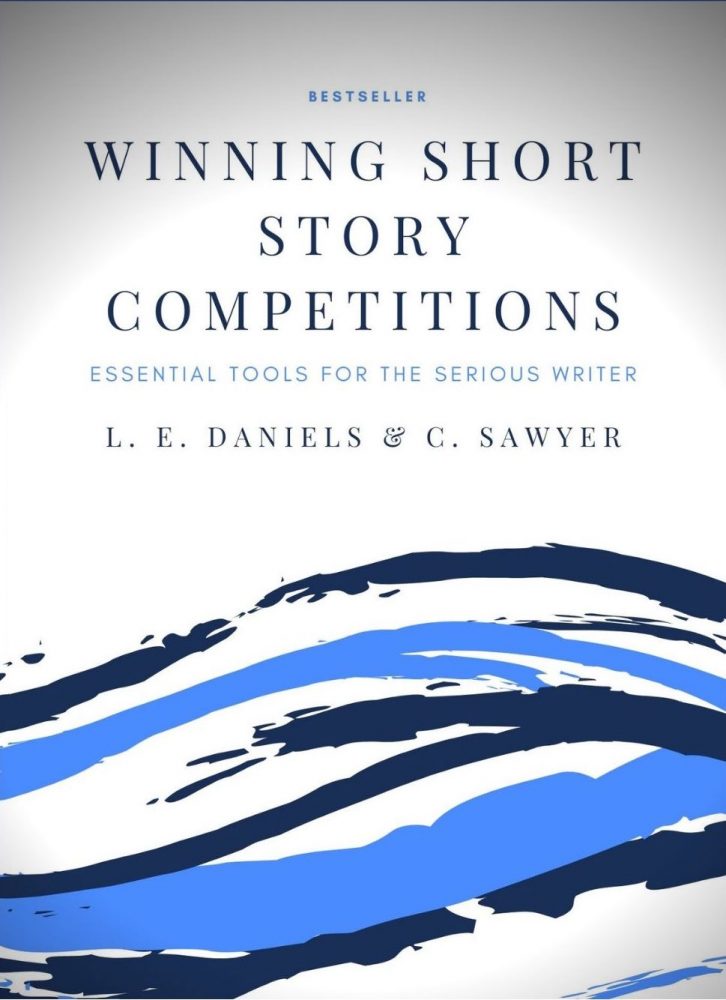 Unrelated but also of note this month was Cass Moriarty’s review of Winning Short Story Competitions: Essential Tools for the Serious Writer (2020) by L.E. Daniels and C. Sawyer. This is the first review of this title in our database. Cass Moriarty says “This slim book packed with information is easily accessible to beginning or emerging writers, as it includes some basic rules and advice for writing short stories…But it will also appeal to those already on the journey of short story writing” because there “are lots of practical, concrete and specific examples, lots of tips and tricks, summaries at the end of most chapters, and the inclusion of winning published short stories as examples.”
Unrelated but also of note this month was Cass Moriarty’s review of Winning Short Story Competitions: Essential Tools for the Serious Writer (2020) by L.E. Daniels and C. Sawyer. This is the first review of this title in our database. Cass Moriarty says “This slim book packed with information is easily accessible to beginning or emerging writers, as it includes some basic rules and advice for writing short stories…But it will also appeal to those already on the journey of short story writing” because there “are lots of practical, concrete and specific examples, lots of tips and tricks, summaries at the end of most chapters, and the inclusion of winning published short stories as examples.”
True Crime
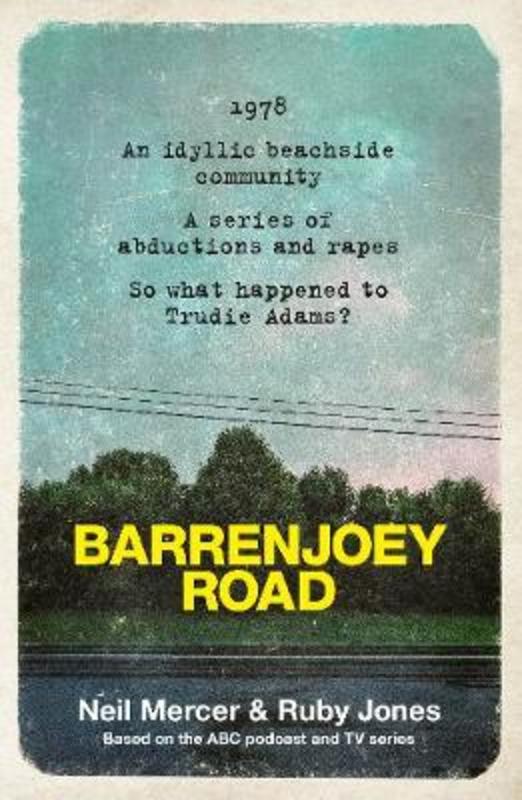 Also reviewed for the first time for the AWWC was the new release Barrenjoey Road (2021) by Ruby Jones, a book based on the acclaimed ABC podcast and TV series of the same name about a 1978 cold case in Sydney’s northern beaches. Prompted by the disappearance of 18-year-old Trudie Adams while hitchhiking home, the investigation by police begins to unravel the dark underbelly of the so-called ‘insular peninsula’. Marianne (Cloggie Downunder) says that “This is a book that will appeal to fans of true crime who may enjoy the pages dense with facts that others may find repetitive. Sixteen pages of colour photographs and a map of the area enhance the text.”
Also reviewed for the first time for the AWWC was the new release Barrenjoey Road (2021) by Ruby Jones, a book based on the acclaimed ABC podcast and TV series of the same name about a 1978 cold case in Sydney’s northern beaches. Prompted by the disappearance of 18-year-old Trudie Adams while hitchhiking home, the investigation by police begins to unravel the dark underbelly of the so-called ‘insular peninsula’. Marianne (Cloggie Downunder) says that “This is a book that will appeal to fans of true crime who may enjoy the pages dense with facts that others may find repetitive. Sixteen pages of colour photographs and a map of the area enhance the text.”
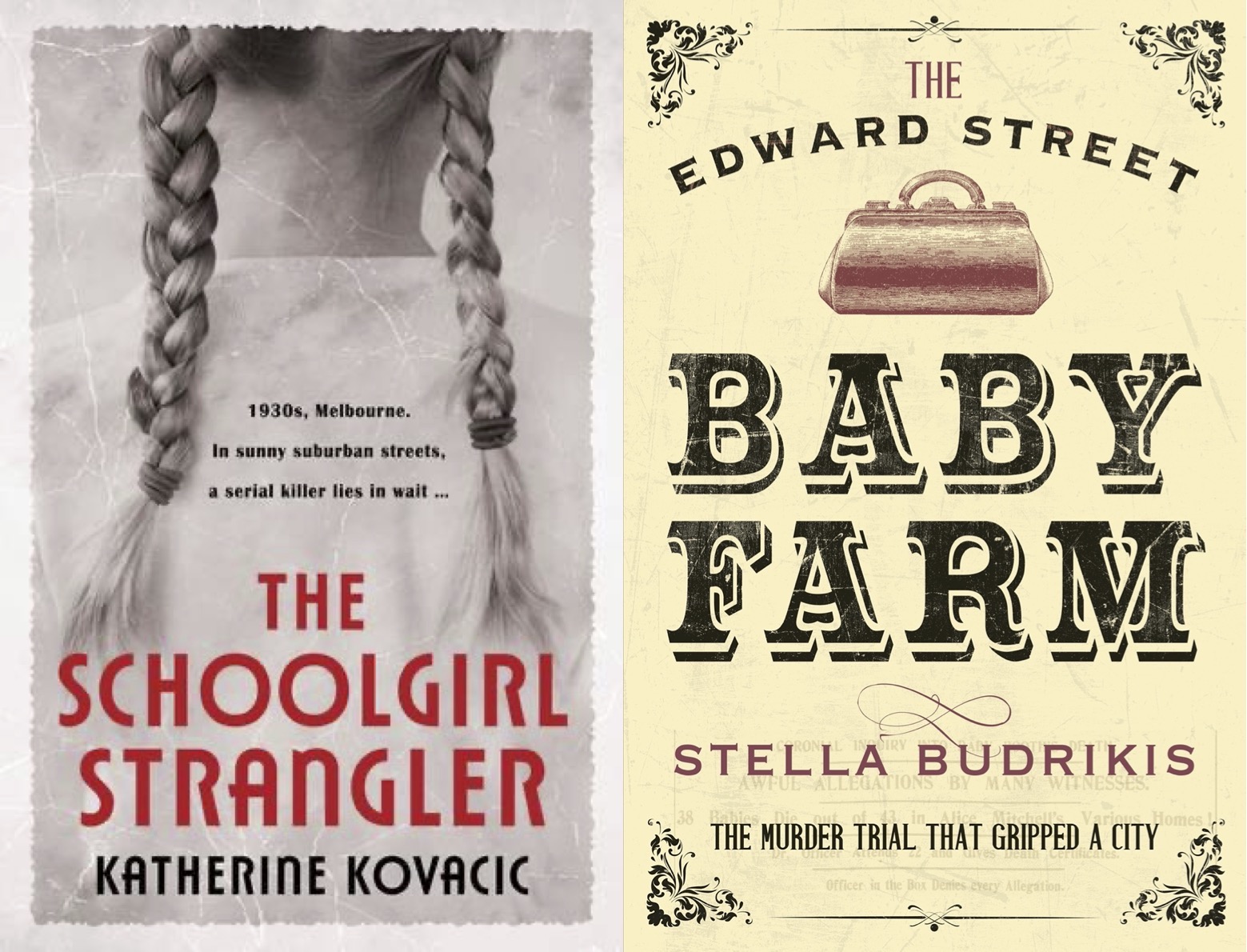 Adding to previous reviews of these titles from the last few months, the reviews of The Schoolgirl Strangler (2021) and The Edward Street Baby Farm (2020) show that interest in social histories of crime remains steady. Both were given strong positive responses with Jennifer Cameron-smith saying of The Schoolgirl Strangler that “Ms Kovacic presents a comprehensive and accessible account of these historic murders, and I recommend this book to anyone with an interest in accounts of true crime” and Nadia L King stating that The Edward Street Baby Farm “is a fascinating and meticulously researched book detailing the trial of Alice Mitchell…[and] an excellent book”.
Adding to previous reviews of these titles from the last few months, the reviews of The Schoolgirl Strangler (2021) and The Edward Street Baby Farm (2020) show that interest in social histories of crime remains steady. Both were given strong positive responses with Jennifer Cameron-smith saying of The Schoolgirl Strangler that “Ms Kovacic presents a comprehensive and accessible account of these historic murders, and I recommend this book to anyone with an interest in accounts of true crime” and Nadia L King stating that The Edward Street Baby Farm “is a fascinating and meticulously researched book detailing the trial of Alice Mitchell…[and] an excellent book”.
Non-Fiction Kid’s Corner
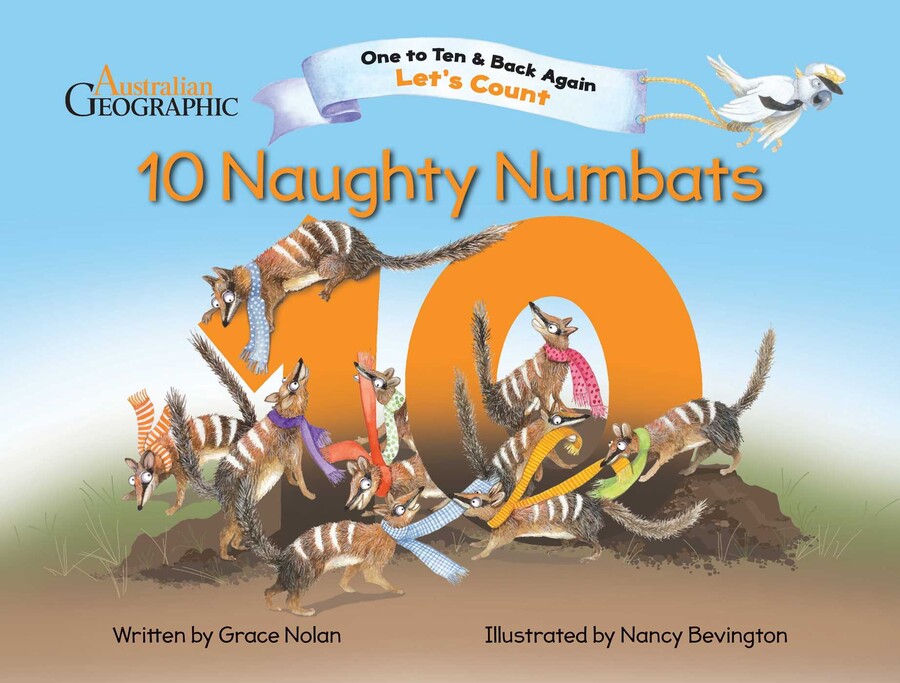 Wonderfully, we once again have a Non-Fiction submission for kids. This month it is 10 Naughty Numbats (2021) by Grace Nolan which is a counting adventure with Australian animals. Ashleigh Meikle at The Book Muse recommends this “cute and educational read that many children will get something exceptional out of” as “each animal has a creative twist – something additional that gives them a touch of personality as they bring numbers and the Australian bush to life”.
Wonderfully, we once again have a Non-Fiction submission for kids. This month it is 10 Naughty Numbats (2021) by Grace Nolan which is a counting adventure with Australian animals. Ashleigh Meikle at The Book Muse recommends this “cute and educational read that many children will get something exceptional out of” as “each animal has a creative twist – something additional that gives them a touch of personality as they bring numbers and the Australian bush to life”.
Aboriginal Poetry
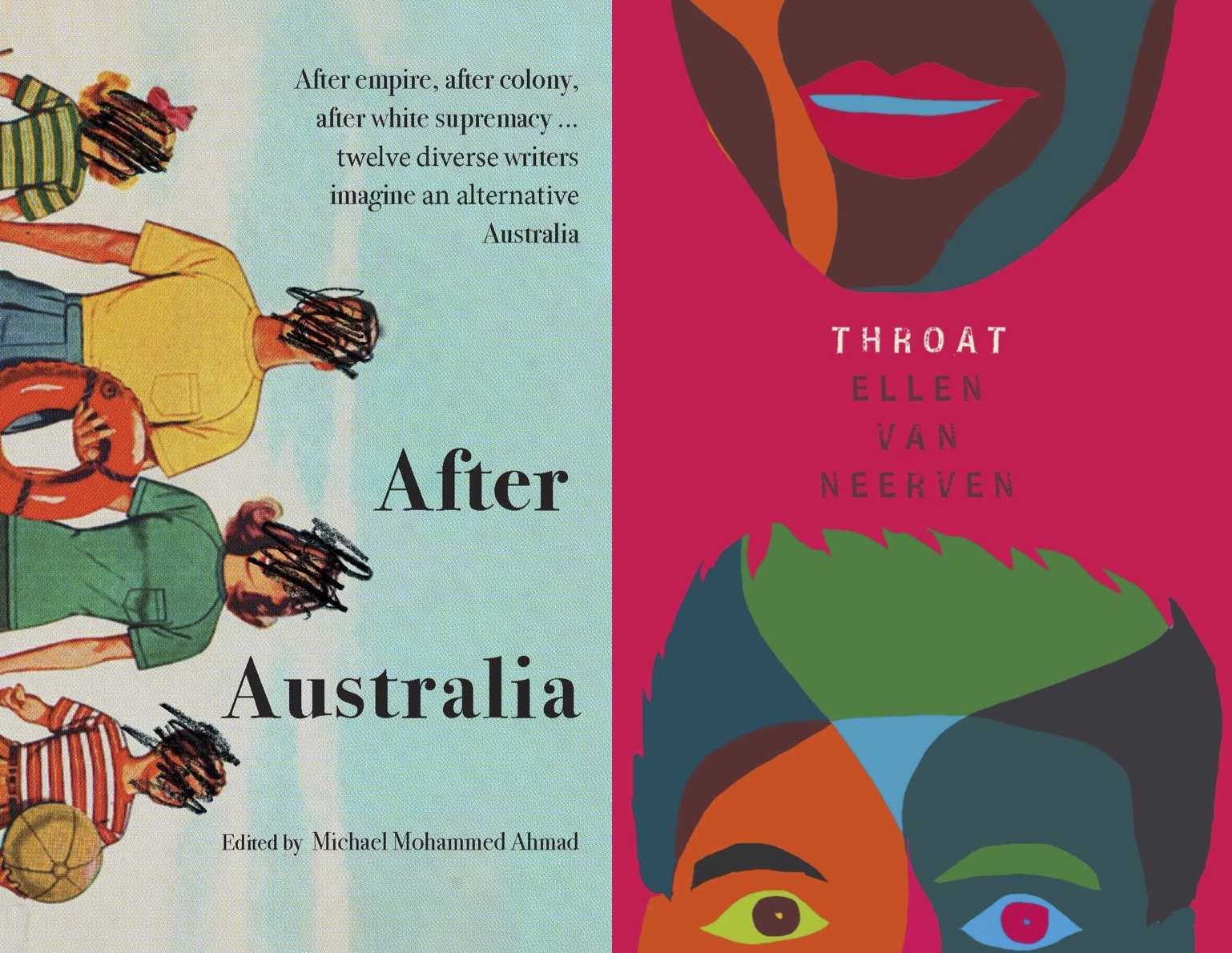 The two poetry books reviewed this month were both collections of Aboriginal verse. This includes pieces in the anthology After Australia (2020) which comprises writing by Indigenous authors and writers of colour that provides a glimpse of Australia as it might be in the year 2050. The entire collection is not poetry but it is interspersed between the short stories. As Cass Moriarty says: “This is a book that challenges our beliefs about politics, religion, class, race, the environment, culture and extremist hate groups. It ‘encourages us to ask important questions about who we are as a nation, how we got here, and where we are headed”. I also found Cass’ discussion of the cover art particularly interesting:
The two poetry books reviewed this month were both collections of Aboriginal verse. This includes pieces in the anthology After Australia (2020) which comprises writing by Indigenous authors and writers of colour that provides a glimpse of Australia as it might be in the year 2050. The entire collection is not poetry but it is interspersed between the short stories. As Cass Moriarty says: “This is a book that challenges our beliefs about politics, religion, class, race, the environment, culture and extremist hate groups. It ‘encourages us to ask important questions about who we are as a nation, how we got here, and where we are headed”. I also found Cass’ discussion of the cover art particularly interesting:
Also reviewed was Throat (2020) by Ellen van Neerven. Although Throat has been reviewed a few times before, I really enjoyed Brona’s candour in discussing it. She says:
I love this review and think it is a fantastic way to respond to Aboriginal poetry, especially if I apply it to someone like me who is white.
Thanks to all the Reviewers
Here is a list of the reviewers mentioned this month and where you can find their work. Visit them, if and when you can. Say that I sent you!
-
- Cass Moriarty — here at Goodreads
- Brenda Telford — here at Goodreads
- Janine Rizzetti — at The Resident Judge of Port Phillip
- Marianne (Cloggie Downunder) — here at Goodreads
- Jennifer Cameron-smith — here at Goodreads
- Nadia L King — here at Goodreads
- Ashleigh Meikle — at The Book Muse
- Brona — at Brona’s Books
Until Next Month!
Happy Reading 🤓📚
And remember, you can join the Australian Women Writers Challenge at any time. You don’t need a website or even a Goodreads account. You can post your review on Facebook, Instagram or any other online medium – Sign Up for the Challenge or Add Your Review now.
By Tegan Edwards
I write about stories and language at Slant Postscripts. I’ve worked extensively on nineteenth century fiction by women and decided it was high time I was more acquainted with books from this period that are closer to home. Did you know that the first book ever published on mainland Australia was by a woman? I have a project about it coming soon!
I write mostly about literary history and classic books which make up much of my research work. However my more personal writing often deals with different concepts such as illness, interpretation, trauma, injustice, and melancholia.

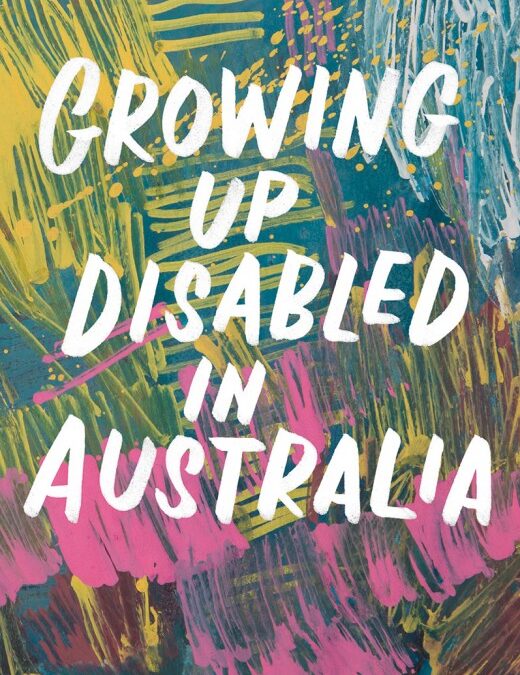




Thank you for the shout out and kind words Tegan. I find reviewing poetry hard to do, so I mostly stick to recording my journey with the work.
Well, I think the way you do it is wonderful!
Great write-up as usual Tegan, covering a fascinating range of books. There are a few here that really interest me including the Growing up Disabled book. How lovely to see a children’s non-fiction book reviewed. As you say, there are too few of them added her.
I have one comment though on your statement that “we are (rightly) looking to the new stories”. I don’t completely agree with the word “rightly” here. I agree that it’s important to keep looking to new stories but I think it is equally important not to forget the old ones. I love seeing older books reviewed here for the challenge – partly because I think we need to read older books to see where we’ve come from, to assess where we are, but also because it’s great to get them added to our database!
I absolutely agree Sue. As I mostly read and work with historical literature I was trying not to be too biased to my own preferences! Because as you say, we need both. Part of the reason I am so fascinated by 19th century novels is because I see concepts that are still so relevant and which were framed in ways we could potentially appreciate even more now as some of the major narratives we know are coming to a crisis point
Phew Tegan! Glad it was just over-correction! I agree with you about older works and their relevance and usefulness to now. It’s so fascinating to see that there’s very little that’s new, really, about human beings.
Great wrap up Tegan, and how generous of you to link to all of the reviewers 🙂